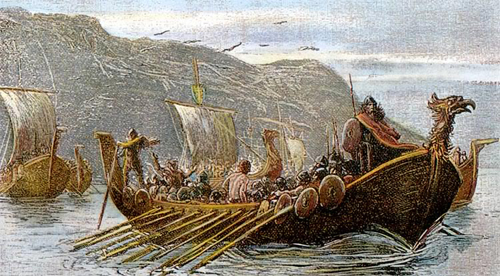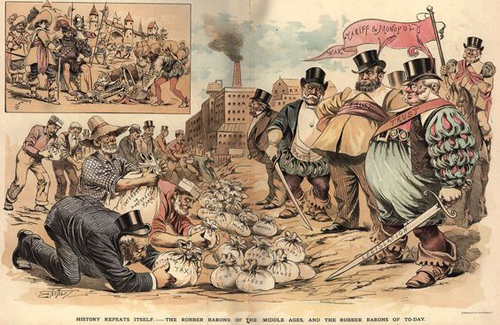I recommend this article in WaPo by David Perry.
In early May, the white supremacist Jeremy Christian — who is accused of killing two men in Portland, Ore., on Friday — posted on Facebook, “Hail Vinland!!! Hail Victory!!!” “Victory” makes sense. Bigots feel empowered these days. But why “Vinland?” Why was this accused attacker talking about the short-lived Viking settlement in North America?
It turns out that white supremacy has gone fully medieval.
As the current contests over Confederate monuments exemplifies, Americans are accustomed to contested narratives about race and history fixating on the American South. Some of the most dangerous terrorists in the U.S., though, are looking much, much, farther north. Vinland was the name that a group of 10th-century Vikings, led by Leif Erikson, gave to a grapevine-rich island off what we believe is the coast of North America. For white supremacists, the concept of Vinland asserts a historical claim over North America, stretching especially from the Northeast coast to the Pacific Northwest. They use the myth of Vinland to position themselves as righteous defenders in the wars of race and religion they believe are coming.

Perry goes on to explain that the real Vikings of history weren’t as “whites only” as the white supremacists imagine, not to mention the fact that the Vinland colony was kind of a bust. But the Viking romanticism is interesting.
Having been raised in a whites-only community well stocked with people harboring racist beliefs, I noticed a long time ago that the worst white supremacists tend to be drearily ordinary. As a rule, they are not particularly bright, accomplished, educated, talented, successful or handsome. They are people who don’t stand out in any way except for the white supremacy thing.
And a long time ago it occurred to me that their very ordinariness was why they made such a Big Bleeping Deal about being white. It was the only attribute they had that made them special.
This is an entirely subjective opinion not backed up by scholarly studies, but I know my people. I sincerely believe a whole lot of these guys go down the white supremacy rabbit hole because they’ve come to live inside a myth that says their whiteness entitles them to greatness. In their own minds they are the heirs to a noble tradition of warrior-men who eventually will return in glory and re-assert their natural superiority over all those other people. And yeah, it’s nonsense, but it’s a fantasy that helps them avoid confronting how utterly banal they and their lives actually are.
We all go through our lives with an internal narrative in which we are the heroes, or at least the leading man or lady (or, if you are a bit warped, the martyr). People who are reasonably well-adjusted live with narratives that are, arguably, not completely divorced from objective reality. We may see ourselves as somewhat more charming or competent or better looking than others do, but as long as that doesn’t get in the way of interpersonal relationships, that’s probably harmless.
But when you see yourself as a noble elite warrior superior being, but you’re really a mediocre little nebbish with a beer gut, this is not healthy. Propping up your self-esteem is normal, but living inside a complete fantasy is not.
And yeah, the attachment to monuments that mythologize the Confederacy and the so-called Lost Cause is closely related to this same phenomenon. The romanticization of the Confederacy is another myth people use to make themselves feel they are part of something heroic, and we could do without it.
Sometimes the myths living in our hearts and subconscious really can elevate us, however. Perry continues,
Vinland wasn’t the only medieval presence at the Portland murders. Taliesin Myrddin Namkai-Meche died fighting to protect the vulnerable people targeted by hate. Myrddin is the Welsh name for Merlin, the great wizard in the court of King Arthur. Taliesin was a 6th century Welsh poet who was later folded into the Arthurian legends. Their namesake died defending the vulnerable. His last words were, like a chivalric hero, to tell the people on the train that he loved them all.
I had recognized the names Taliesin and Myrddin, and as Perry is a Welsh surname, those names probably popped out to David Perry as they did to me. What a terrible waste.
History has never just been “the past.” As a historian, I study the way that groups have always tried to assert control over their story, seeking to mold legend, myth and reality into a useful narrative about identity and destiny. Stories like this have power, and we’d be foolish to ignore the threat.
Expanding this topic just a bit — it’s probably the case that people who have a normal amount of self-esteem, who are reasonably satisfied with their lives, and who feel connected to the communities they live in, are less likely to be sucked into Viking fantasy land than someone who feels alienated from himself and uncomfortable with the world.
“Religion and nationalism,” wrote the great philosopher/psychoanalyst Erich Fromm, “as well as any custom and any belief however absurd and degrading, if it only connects the individual with others, are refuges from what man most dreads: isolation.”
There always will be individuals who, for many reasons, never find a place for themselves in the world. But when people form movements based on their shared fantasies, and when they start slashing people on trains, or on London Bridge, it becomes a bigger problem. Young men especially seem vulnerable to losing themselves this way, but any sort of person could be vulnerable.
From what I have seen of radical, militant Islam, the most extreme versions especially, it is less about religious devotion than it is about alienated people living in a fantasy about their own ethnic and cultural entitlements, and resentments, combined with myths of past glory and future destiny. That the fantasy is packaged in Islam speaks to the way Islam dominates history and cultural identity in some parts of the world, but Islam isn’t the primary cause. I propose that Islamic terrorism basically stems from the same syndrome that inspires Jeremy Christian to live in a Viking fantasy.
And I don’t necessarily think this is “crazy.” I’ve heard nothing to make me thing Jeremy Christian is psychotic, as in hearing voices or seeing things that aren’t there. I’m not sure how a psychiatric professional would classify this, but seems to me it’s more of a social or cultural pathology than a “mental illness.”
And as we’re still sometimes having the argument about whether outreach to the white working class requires betraying racial equality, consider that racism is a common refuge for alienated white guys. And currently we’ve got a generation of white guys whose fathers had steady union jobs with good wages and benefits that are now long gone. If racism is growing in this population, the way to combat that is not to yell at them, but to come up with ways to help them feel connected to a more progressive vision. Martin Longman has some thoughts on this.
And it’s likely that “getting tough” and dropping bombs will have little impact on terrorism in the Muslim world, except maybe to make it grow.
And we must tackle the myths, head on. For example, tear down the Confederate monuments that mythologize the Confederacy; replace the myths with the actual history of the Confederacy and the brutality of slavery. We’ve let the “Lost Cause” nonsense fester far too long. The play-pretend Vikings may be a little harder to reach. But David Perry writes,
American white supremacists want to make Vinland great again, laying out an imagined past in which Vikings are the rightful conquerors of North America, locked in eternal battle with the Skraelings, the Viking slur for indigenous people. We must inoculate ourselves against this hate by telling a better story, one that recognizes the many errors of our past, but also lays out a vision for a more inclusive future.
That last part is most important, I think.



